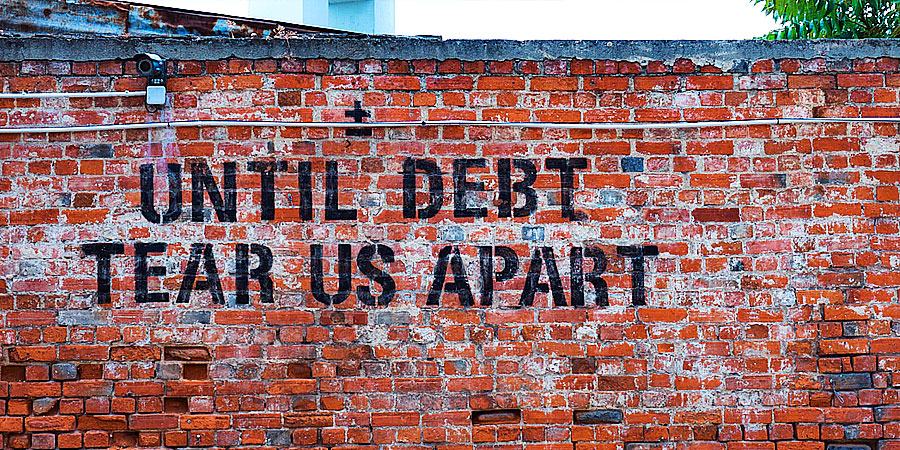Let’s pretend that you’ve come into some extra money on top of your regular paycheck. It could be that it was expected, such as a tax refund, or not expected, like finding fifty bucks behind the couch cushion.
What are you going to do with it?
I know, you’re first instinct is to hire that inflatable bouncy castle and invite your friends around.
Although, that annoying voice in your head is telling you to be more responsible and act like a boring adult for once. So annoying.
So you resign yourself between using it to either pay off debts or chuck it into your savings. All good grown-ups have savings, right?
But now you’re wondering which would be better. I mean, if you’re going to do the responsible thing, it might as well be the best decision for your finances. Especially if you have to give up an afternoon of jumping for it.
A few searches hasn’t helped. Some say debt, others say savings. It seems everyone has an opinion.
You want the facts!
Excellent. So let’s look at the facts then. We’ll use Ms. Average to conduct our experiment.
Ms. Average’s starting financial position is
- Credit Card @ 16% – owing $2,550 (minimum payment $52)
- Store Card @ 14% – owing $700 (minimum payment $20)
- Car Loan @ 7% – owing $6,750 (minimum payment $136)
- TOTAL DEBT = $10,000
- Emergency Fund $2,000
- Yearly Expenses Fund $570
- TOTAL SAVINGS = $2,570 @ 2% Interest
Ms. Average is also doing the right thing and has budgeted:
- $500 a month for debt reduction
- $100 a month for savings
And she’s just got her tax refund. A healthy $2,000 which according to Google is the average tax refund and Ms. Average is nothing if
- PLUS $2,000 lump sum to put on either debt or savings.
Now we need to do some maths. Yeah, I know, but I’ve already done it, so we might as well include it in this post. You can glaze over if you want and just skip to the end to find out which was better. I won’t mind.
But in the sake of appearing legit and all, I’ve included all my workings out so someone with an actual program (rather than the spreadsheet I used) will pick apart my mistakes to the third decimal point and let me know, so helpfully, in the comments. 😉
Okay.
So this experiment is going to run over an imaginary twenty-two months. Why such a random number do you ask? Well, that’s because I wanted to take the experiment though to where Ms. Average, in both cases, has paid off all her debts.
And in the case where she puts the money into savings, rather than on her debts, that’s the longest time-frame.
Now that we’ve established that, let’s look at the difference in her savings, based on whether she puts that extra $2,000 on her debts or into her savings account.
Savings:
Starting Balance $2,570 @ 2%.
Comparison table between depositing $2,000 to begin then after 17 months using money freed up from debt reduction to concentrate on savings.
| Deposit | Savings without $2K | Deposit | Savings with $2K | |
| Month 1 | 100 | $2,674.28 | 2100 | $4,677.62 |
| Month 2 | 100 | $2,778.74 | 100 | $4,785.41 |
| Month 3 | 100 | $2,883.37 | 100 | $4,893.39 |
| Month 4 | 100 | $2,988.18 | 100 | $5,001.54 |
| Month 5 | 100 | $3,093.16 | 100 | $5,109.88 |
| Month 6 | 100 | $3,198.31 | 100 | $5,218.40 |
| Month 7 | 100 | $3,303.64 | 100 | $5,327.09 |
| Month 8 | 100 | $3,409.15 | 100 | $5,435.97 |
| Month 9 | 100 | $3,514.83 | 100 | $5,545.03 |
| Month 10 | 100 | $3,620.69 | 100 | $5,654.27 |
| Month 11 | 100 | $3,726.72 | 100 | $5,763.70 |
| Month 12 | 100 | $3,832.94 | 100 | $5,873.30 |
| Month 13 | 100 | $3,939.32 | 100 | $5,983.09 |
| Month 14 | 100 | $4,045.89 | 100 | $6,093.06 |
| Month 15 | 100 | $4,152.63 | 100 | $6,203.22 |
| Month 16 | 100 | $4,259.55 | 100 | $6,313.56 |
| Month 17 | 100 | $4,366.65 | 100 | $6,424.08 |
| Month 18 | 600 | $4,973.93 | 100 | $6,534.79 |
| Month 19 | 600 | $5,582.22 | 100 | $6,645.68 |
| Month 20 | 600 | $6,191.52 | 100 | $6,756.76 |
| Month 21 | 600 | $6,801.84 | 100 | $6,868.02 |
| Month 22 | 600 | $7,413.18 | 100 | $6,979.46 |
- An extra $433.72 by paying debt off first.
Great, according to this, after twenty-two months, Ms. Average is actually better off putting her money onto her debt, since by doing this she’s ended up with more money. (Because she used the money she no longer needed to pay off debts to put into savings.)
Debts:
Starting WITHOUT the initial $2,000 deposit:
| Month | Payment | interest | Balance |
| Start | $0.00 | 0 | $10,000.00 |
| Month 1 | $500.00 | $81.54 | $9,581.54 |
| Month 2 | $500.00 | $76.71 | $9,158.25 |
| Month 3 | $500.00 | $71.81 | $8,730.06 |
| Month 4 | $500.00 | $66.86 | $8,296.92 |
| Month 5 | $500.00 | $61.84 | $7,858.76 |
| Month 6 | $500.00 | $56.76 | $7,415.52 |
| Month 7 | $500.00 | $51.62 | $6,967.13 |
| Month 8 | $500.00 | $46.41 | $6,513.54 |
| Month 9 | $500.00 | $42.36 | $6,055.90 |
| Month 10 | $500.00 | $37.61 | $5,593.51 |
| Month 11 | $500.00 | $33.20 | $5,126.71 |
| Month 12 | $500.00 | $30.48 | $4,657.18 |
| Month 13 | $500.00 | $27.74 | $4,184.92 |
| Month 14 | $500.00 | $24.98 | $3,709.90 |
| Month 15 | $500.00 | $22.21 | $3,232.11 |
| Month 16 | $500.00 | $19.42 | $2,751.54 |
| Month 17 | $500.00 | $16.62 | $2,268.16 |
| Month 18 | $500.00 | $13.80 | $1,781.96 |
| Month 19 | $500.00 | $10.96 | $1,292.92 |
| Month 20 | $500.00 | $8.11 | $801.04 |
| Month 21 | $500.00 | $5.24 | $306.28 |
| Month 22 | $308.64 | $2.36 | $0.00 |
- $808.64 Paid in Interest.
- Note the figures vary from the video below – I was slightly off first time before re-checking. These are the correct numbers and the conclusion is the same. Debt paid off in 22 months.
Starting WITH the initial $2,000 deposit:
| Month | Payment | interest | Balance |
| Start | $0.00 | 0 | $10,000.00 |
| Month 1 | $2,500.00 | $54.88 | $7,554.88 |
| Month 2 | $500.00 | $49.68 | $7,104.56 |
| Month 3 | $500.00 | $44.64 | $6,649.20 |
| Month 4 | $500.00 | $39.90 | $6,189.10 |
| Month 5 | $500.00 | $38.35 | $5,727.46 |
| Month 6 | $500.00 | $33.40 | $5,260.85 |
| Month 7 | $500.00 | $30.68 | $4,791.53 |
| Month 8 | $500.00 | $27.94 | $4,319.47 |
| Month 9 | $500.00 | $25.18 | $3,844.65 |
| Month 10 | $500.00 | $22.41 | $3,367.06 |
| Month 11 | $500.00 | $19.63 | $2,886.69 |
| Month 12 | $500.00 | $16.83 | $2,403.52 |
| Month 13 | $500.00 | $14.01 | $1,917.53 |
| Month 14 | $500.00 | $11.17 | $1,428.70 |
| Month 15 | $500.00 | $8.32 | $937.02 |
| Month 16 | $500.00 | $5.45 | $442.47 |
| Month 17 | $445.04 | $2.57 | $0.00 |
- $445.04 Paid in Interest. Debt-Free after 17 months.
The main difference between the two debt tables is in the first example, where she put the $2K into savings, it took 22 months to pay off her debts, and she ended up paying $808.64 in interest.
In the second example, where she put the $2K onto her debts instead, it took her 17 months to pay off her debts, and she paid $445.04 in interest instead.
So she saved herself $363.60 in extra payments to the bank by putting the lump sum cash onto her debts rather than into her savings.
The Results
Ms. Average started with $10,000 in debts, $2570 in savings, and she got a $2,000 tax refund.
In one case she put the $2,000 upfront into her savings account. That resulted in paying off all her debts after 22 months and ending up with $6,979.46 in her savings account. During those 22 months she paid $808.64 in interest payments to the bank.
On the other side, where she put $2,000 onto her debts instead. She became debt-free after 17 months – a full five months earlier, which meant she freed up that cash she was using for debt reduction and was able to put it into her savings instead. She finished the 22 months (same time period as before) with $7,413.18 in her savings account ($433.72 more!) and paid $445.04 in interest payments on her debt ($363.60 less to the bank).
Overall, putting the money onto her debts rather than into her savings resulted in a better financial position over the same time frame.
So You Should Always Choose Debt Reduction Over Savings Then?
In the majority of cases, yes.
However, I also think you should allocate some money to savings as well, especially if you don’t have an emergency fund or yearly expenses fund as these act as “insurance” against accumulating more debt. That is, if you have extra money to cover unexpected or higher than usual expenses, you won’t need to use your credit card for them, y
But of course, everyone’s situation is different, you’ll have varying amounts to budget for debts and savings and different levels of debt and interest rates.
A good rule of thumb is that whichever has the highest interest rate (your debts or your savings account), that’s where you should focus the majority of your money.
Header Image By: Ehud Neuhaus



2 Comments
Hi Tracey,
I was wondering if you could answer a question for me 🙂
I like this post about debts but I am not sure if it is applicable to my situation. I have been careful to avoid getting into debt in MOST areas of my life. Sadly I didnt apply this rule when deciding to study. I have a HELP (formerly HECS) debt of almost 60K. This debt technically doesnt have interest but indexation is applied to it (which I barely understand). Do you think its better to try and pay off this debt quickly or to just make the minimum repayments and have more money in my pocket for other things. Thanks
In my opinion, HELP is a low priority debt, mostly because of the way it’s paid back – through the tax system, and because it’s not accumulating interest. It does go up through indexation (indexation just means that it’s going to go up slowly each year to keep in line with inflation. I think this year it went up 2%) but it’s not a high rate like a regular loan would accrue.
Just make the minimum payments that you have to, and look for other places to put your money 🙂